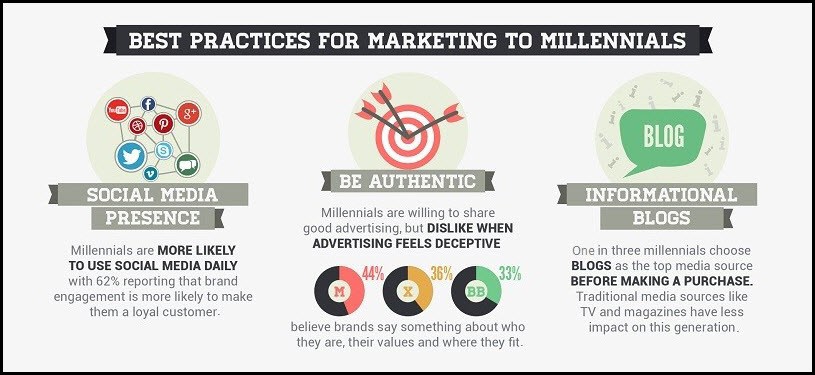Remi’s Rebarks – Marketing to Millennials: Avoid the Herd Mentality
Millennials are a unique breed of consumers that require different marketing tactics.
I love making new friends. It doesn’t matter how big or small they are, or even what species they belong to. So, I was excited to meet this cute little lamb named Clover at our local pet store.
I tried to lead my new friend down the rawhide aisle (my all-time favorite spot), but Clover let out a “BLEAT!” and scampered away. Since I don’t speak sheep, I was confused. Who doesn’t want to peruse the amazing selection of chewy bones?
My human patiently explained that lambs aren’t interested in rawhide, or in many of the things that I’m interested in for that matter. Wow, who knew?
When it comes to marketing, you can’t just herd everyone into your buyers’ funnel with the same techniques. People, like animals, are different.
Millennials are People, Too
Take Millennials for example. Although there is some disagreement on the exact age range that defines this group (born approximately between 1977 and 2000), they make up 25% of the U.S. population. That’s a large and diverse group of people, spanning the ages of 17-40. Ignoring them as customers is as bone-headed as leaving a steak unattended within my considerable reach!
Of course, to market successfully to this group, you must spend some time getting to know who they are, what they value, and how they respond to different marketing tactics. Experts have claimed that millennials are the trickiest group to market to, but that doesn’t mean it’s impossible. Let’s start with a few stats:
- A large segment is settling down and starting families—millennials are parents to 50% of U.S. children.
- Millennials are the best-educated group of young adults in U.S. history, with one-third having earned at least a 4-year college degree.
- They have an entrepreneurial spirit—54% of millennials either want to start their own business or have already started their own. Many have stated that they don’t want a typical 9-to-5 job.
- Yet, 87% of millennials in the workforce are in management positions at the companies they work for.
- They love technology—millennials are 2.5x more likely to be early adopters of tech than other generations.
- Millennials have money to spend—studies predict this group will spend $1.4 trillion in 2020 (that’s a lot of rawhide bones!).
Looking for Something Extra
Although I’m too young to be a millennial, I do have something in common with this group: I always look for that extra something when I shop for toys: Does it look like a real animal? Is the squeaker loud and annoying? Do proceeds from the purchase support the Humane Society?
For millennials, simply having a great product and offering a good deal is not enough. They need a reason to buy your product. For instance:
- According to the latest research, 50% of millennials are more willing to make a purchase if your company supports some type of cause.
- In addition, 37% of millennials say they are willing to purchase a product or service that supports a cause they believe in, even if it means paying extra.
- Research also shows that 75% of millennials want companies to give back to society with their profits.
A good example of a company that runs their business model to cater specifically to millennials is TOMS. For every product that a person purchases from TOMS, the company will donate a pair of shoes to someone in need. Their tagline “Every purchase has a purpose” resonates with millennials. In fact, though Nike spends billions on marketing, a survey found that millennials like TOMS more!
Other companies that have tapped into this appeal include Warby Parker, which donates a pair of eyeglasses to someone in need with every purchase and Love Your Melon, an apparel company that contributes a portion of profits to fight childhood cancer.
A Little Help from Their Friends
If you’re trying to reach millennials with advertising, forget about it. Like my buddy, Clover, they’ll just bleat at you and run away. According to Hubspot, 84% of millennials do not trust advertising. So, how do you track down this wily group?
Well, data from SocialChorus revealed that 95% of millennials say that friends are the most credible source for product information (i.e., friend reviews or recommendations). This means that “social proof” is key to marketing to millennials. Social proof can include:
- Online reviews of your product (be sure to put a face to each review)
- Case studies about how someone grew their business or benefited from using your product
- Reviews on sites like Facebook, Google or Yelp
Of course, before you can get a review, you have to ask for one! Research by BrightLocal found that only 70% of customers have been asked to leave a review. Also, make sure to keep asking: 44% of millennials say a review must be written within one month to be relevant. The key is to make the process quick and easy, whether it’s online, at the bottom of a receipt, on Facebook or Twitter or in emails.
Getting Social for Success
According to Nielsen, millennials use smartphones more than other group (93% have them) and the number one application used on their phones is Facebook, followed by Facebook Messenger, YouTube, Google Maps, Google Search, Google Play, Gmail, Instagram, Apple Music and the Amazon App.
While 87% of millennials are on Facebook, they can also be found on Instagram, YouTube, LinkedIn, Pinterest, Snapchat and Twitter. (How do humans find the time to be looking at all these things?)
According to Forbes, 62% of millennials say that they are more likely to become a customer if that brand interacts and engages with them personally on social media.
Millennials Want to Connect through Content
So how do you interact and engage with this group? Data suggests that millennials value genuine conversation and interaction through content. They want to engage with authentic brand messages and stories that help them to get to know your brand and what your company stands for.
You can do this by consistently publishing quality content (i.e., that educates and shows your brand’s personality and expertise) on your website or blog and posting on social media. And, since millennials are the biggest sharers of social content, they’re highly likely to pass along your content to their friends.

Summing it Up
Though I still feel a bit sheepish about not taking the time to understand my buddy Clover, I now realize the value of getting to know others. When it comes to millennials, remember that they’re very mobile and like to stay connected via technology. They’re smart and tech-savvy and value experiences and companies that support a cause. They search online for information about products before making a purchase and trust social reviews and recommendations from friends. They also like to be part of your brand/company experience through content, so be sure to invite them in.
As for Clover, I learned that she likes to eat alfalfa (eww!) and thinks bananas are an awesome treat (no thanks!). But I still love her.
Sources:
- “Millennials stand out for their technology use, but older generations also embrace digital life,” by Emily A. Vogels, Pew Research, 2019.
- “The Solution to Connecting with and Marketing to Millennials,” by Sherman, Lyfe Marketing, 2019.
- “The Ultimate Guide to Millennial Marketing,” by Neil Patel, NP Digital.
